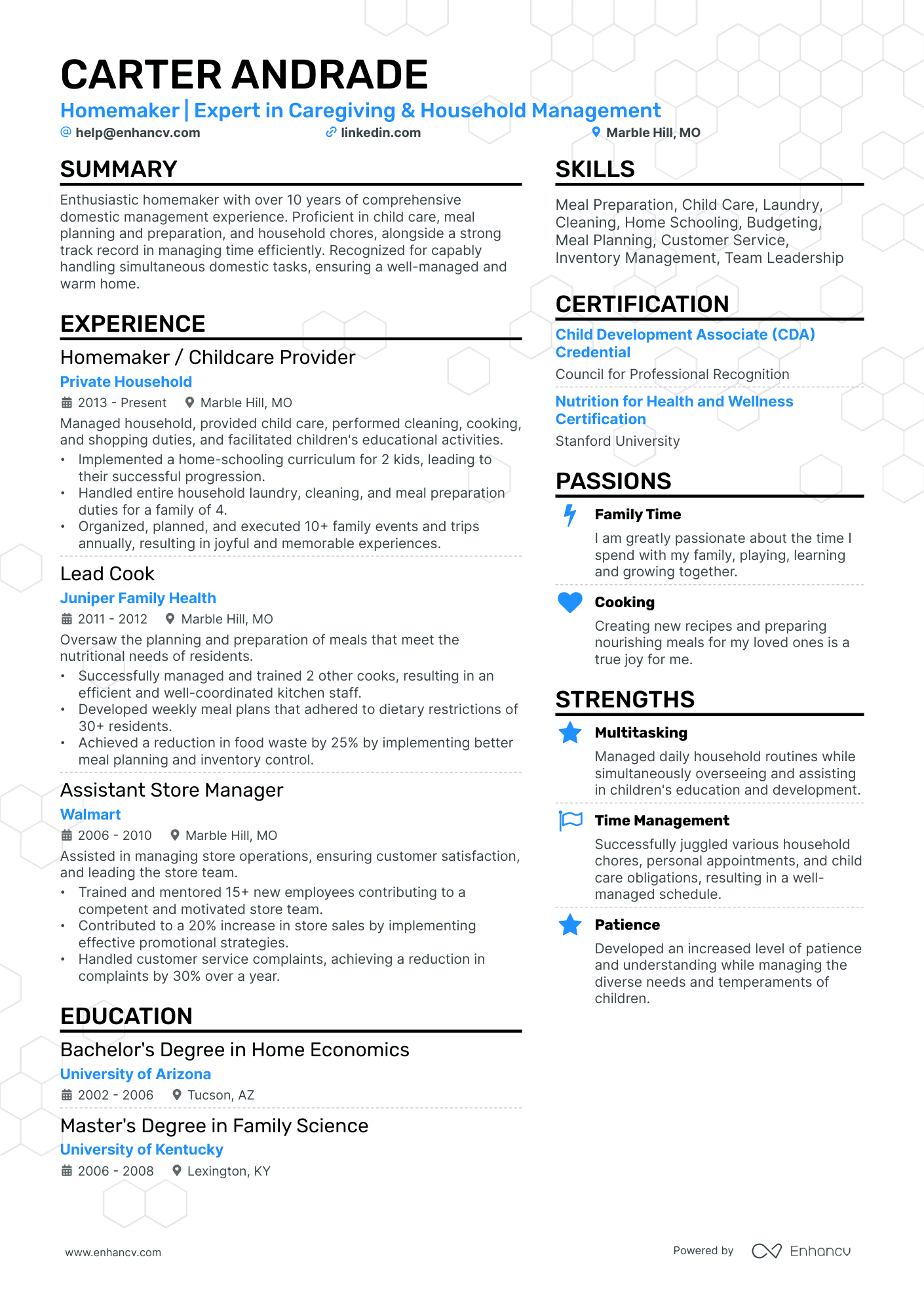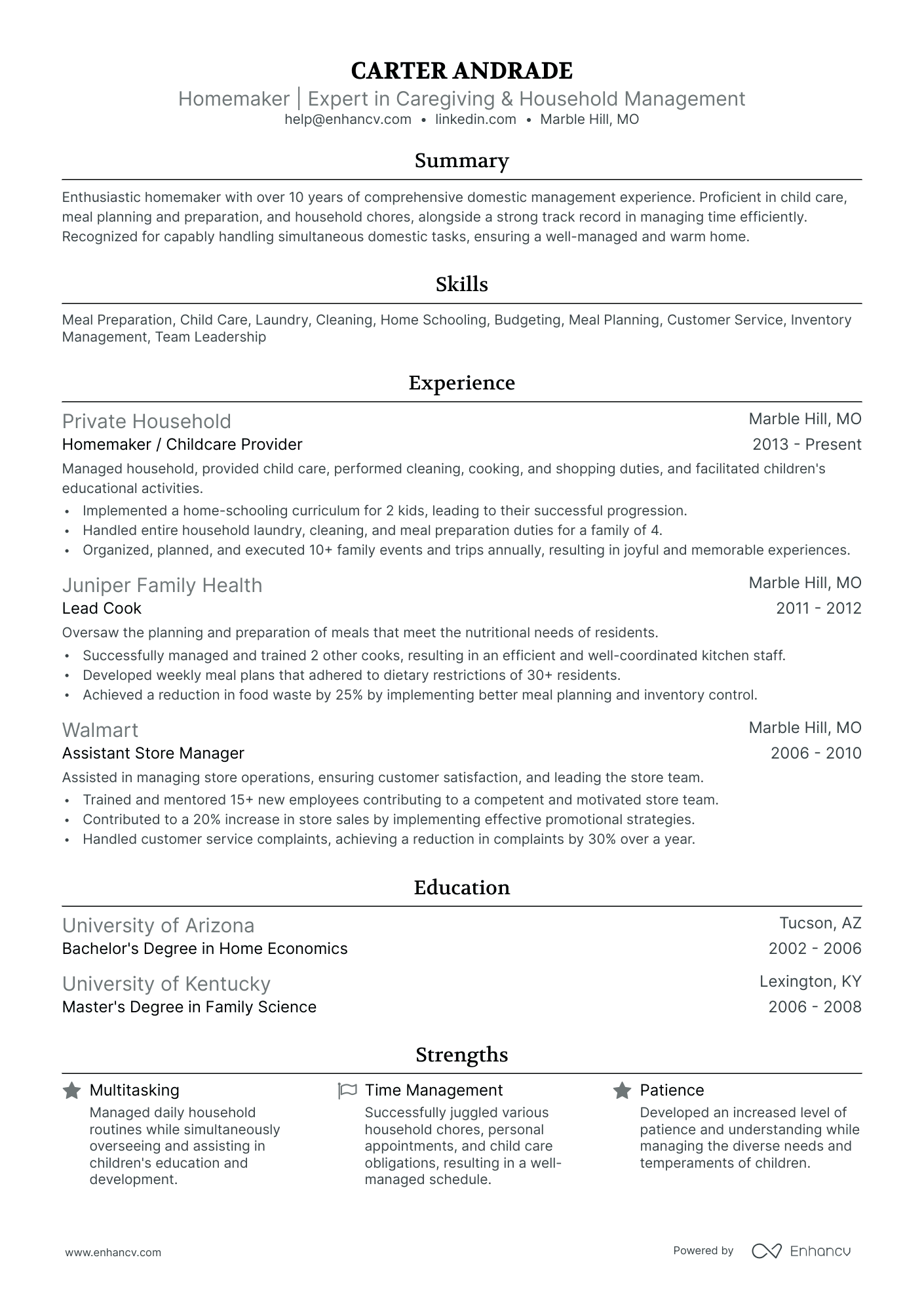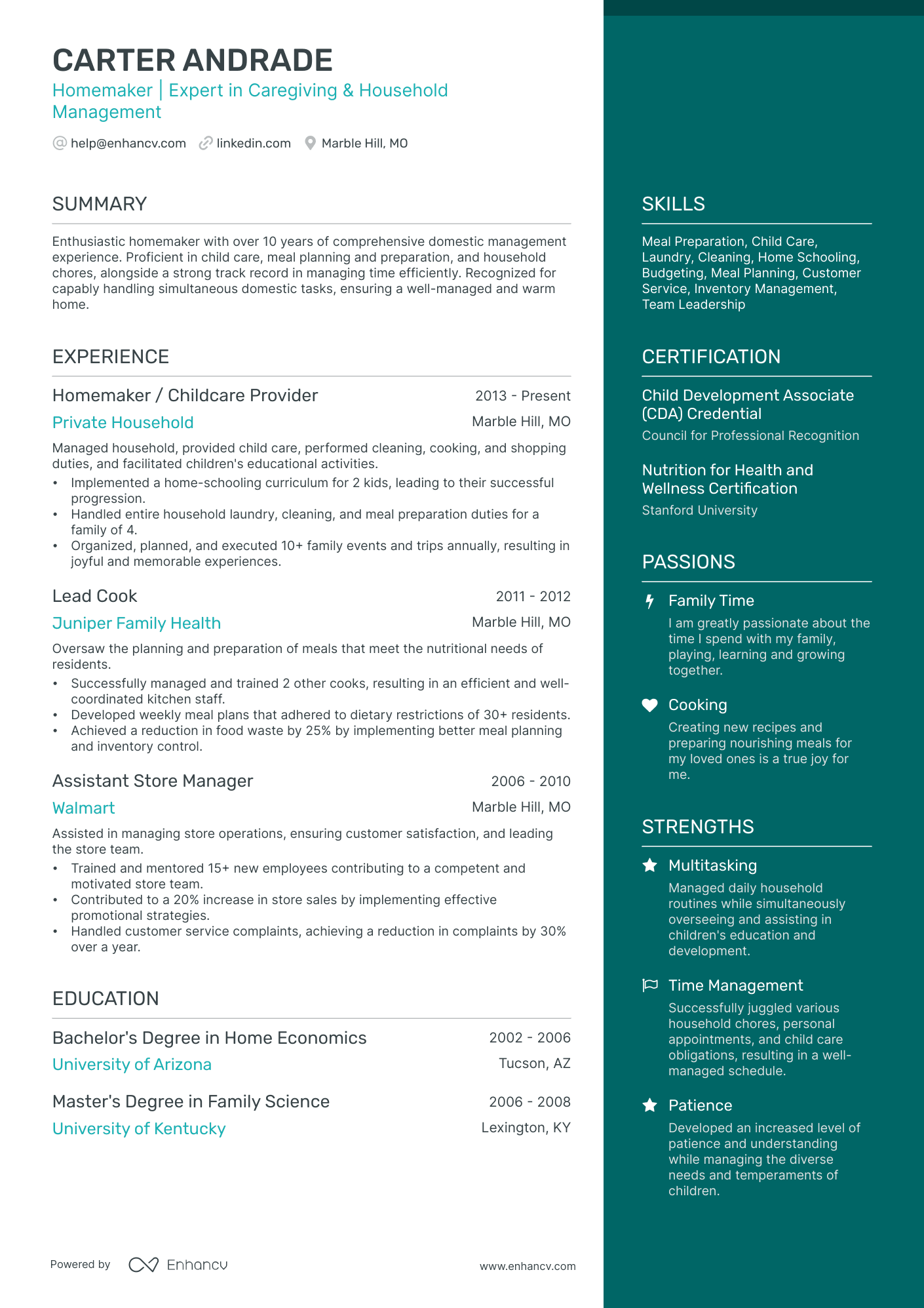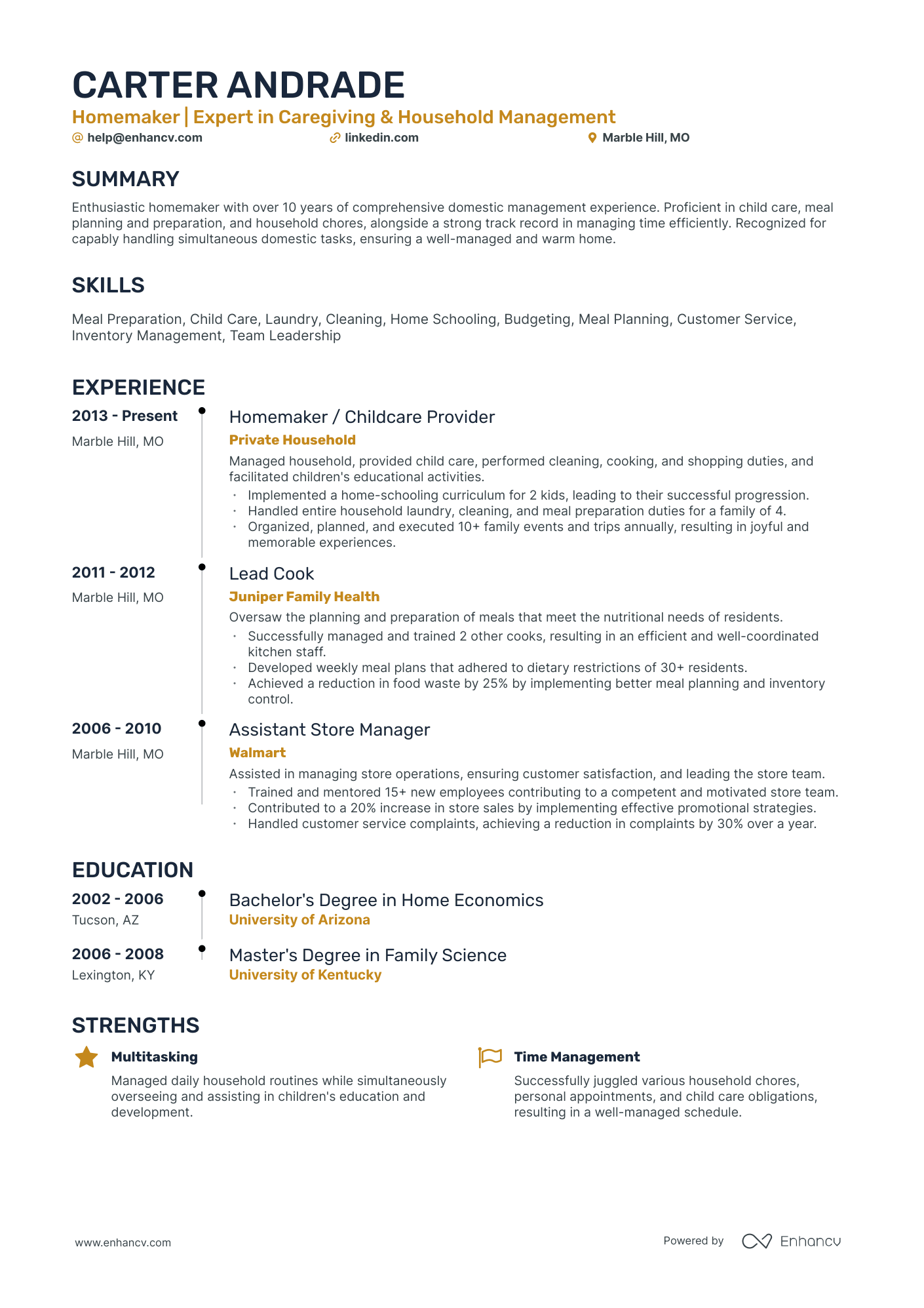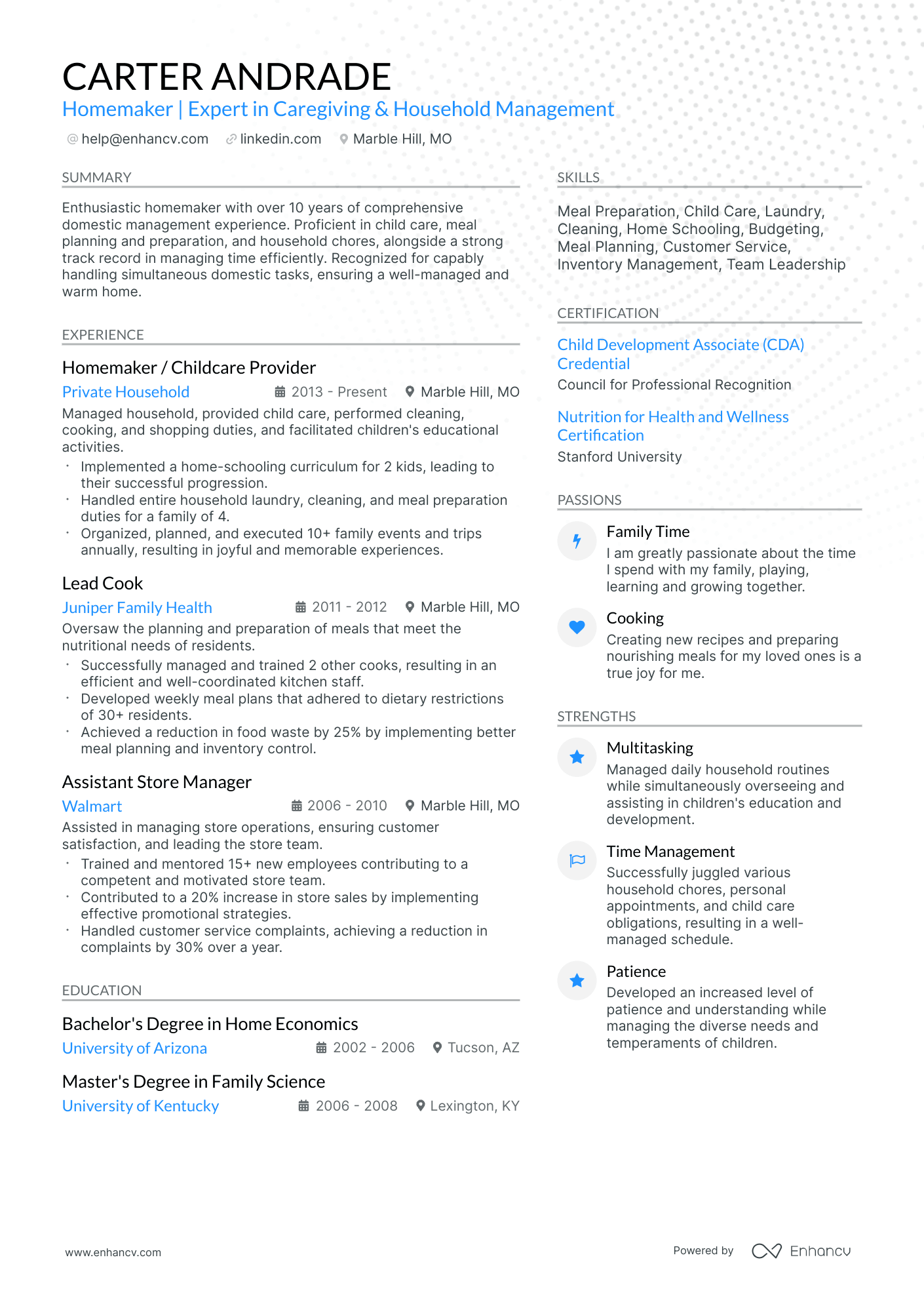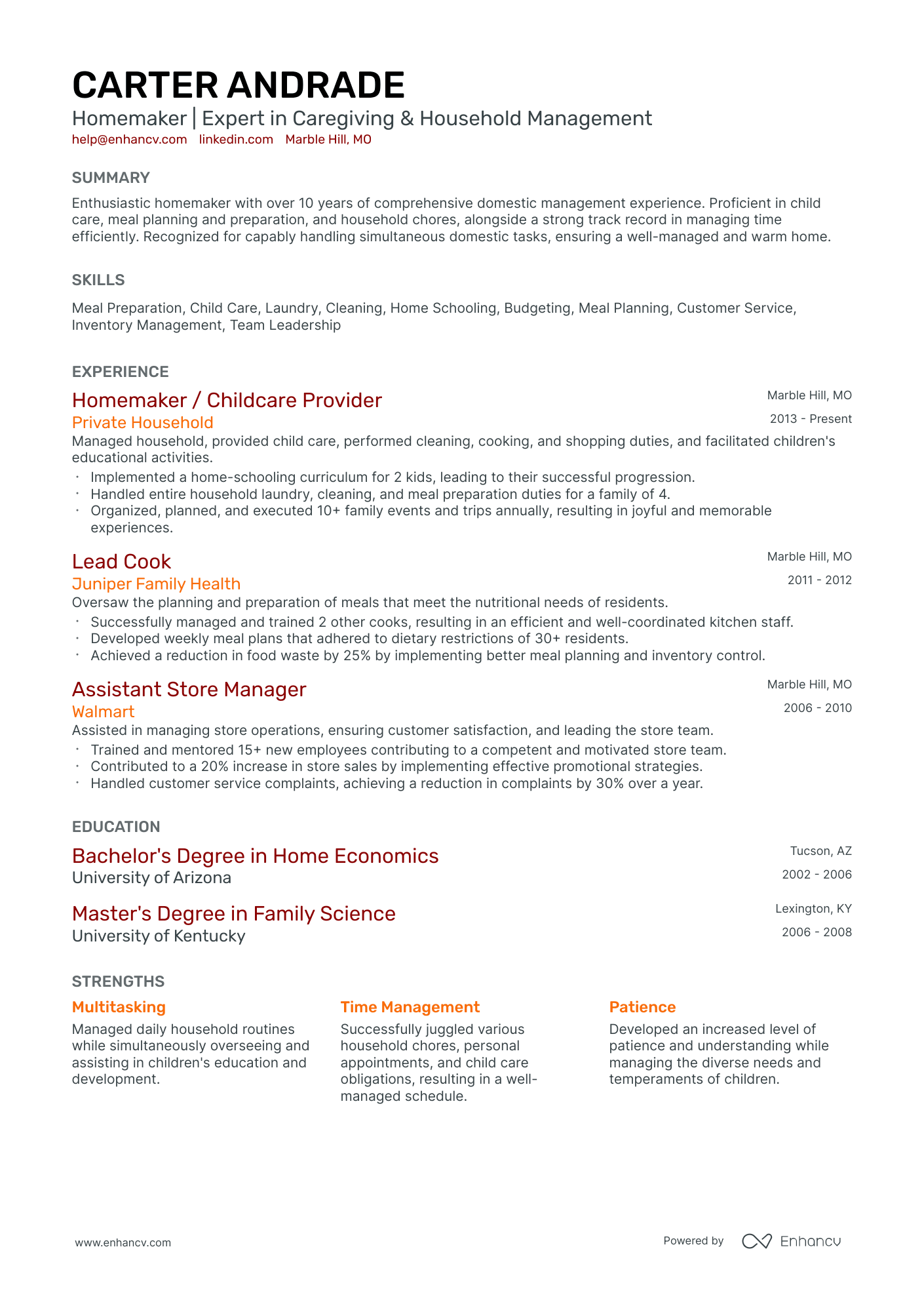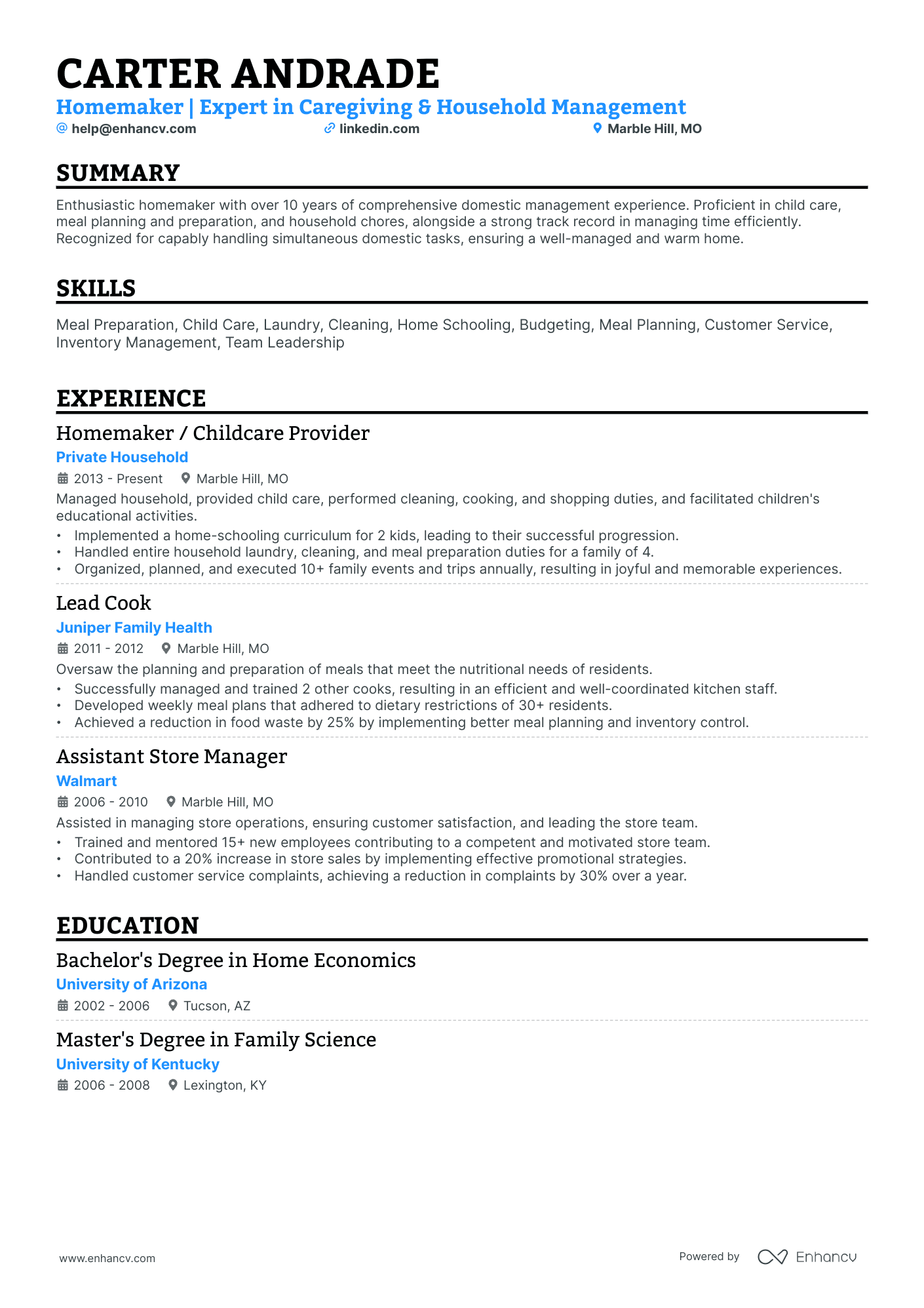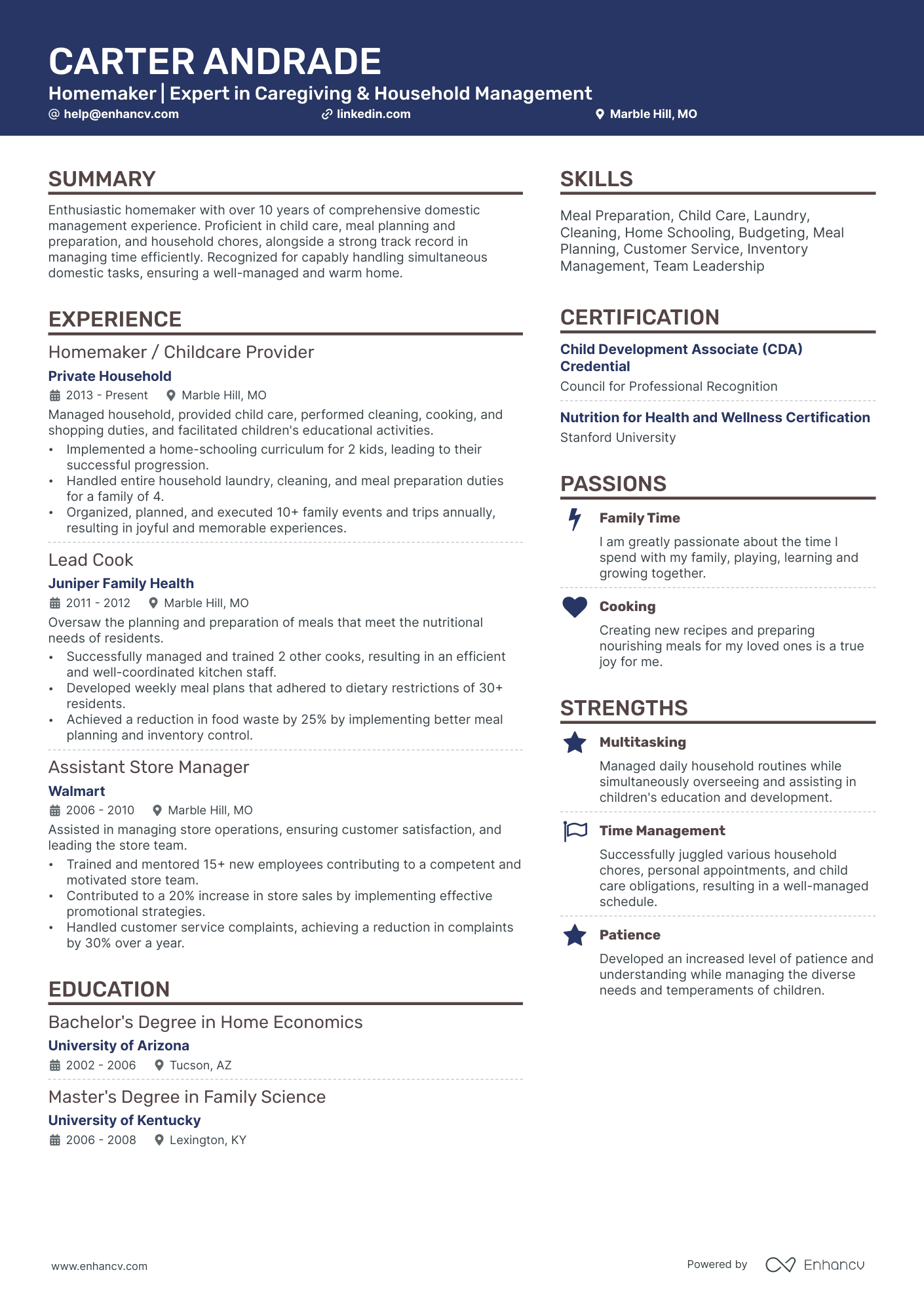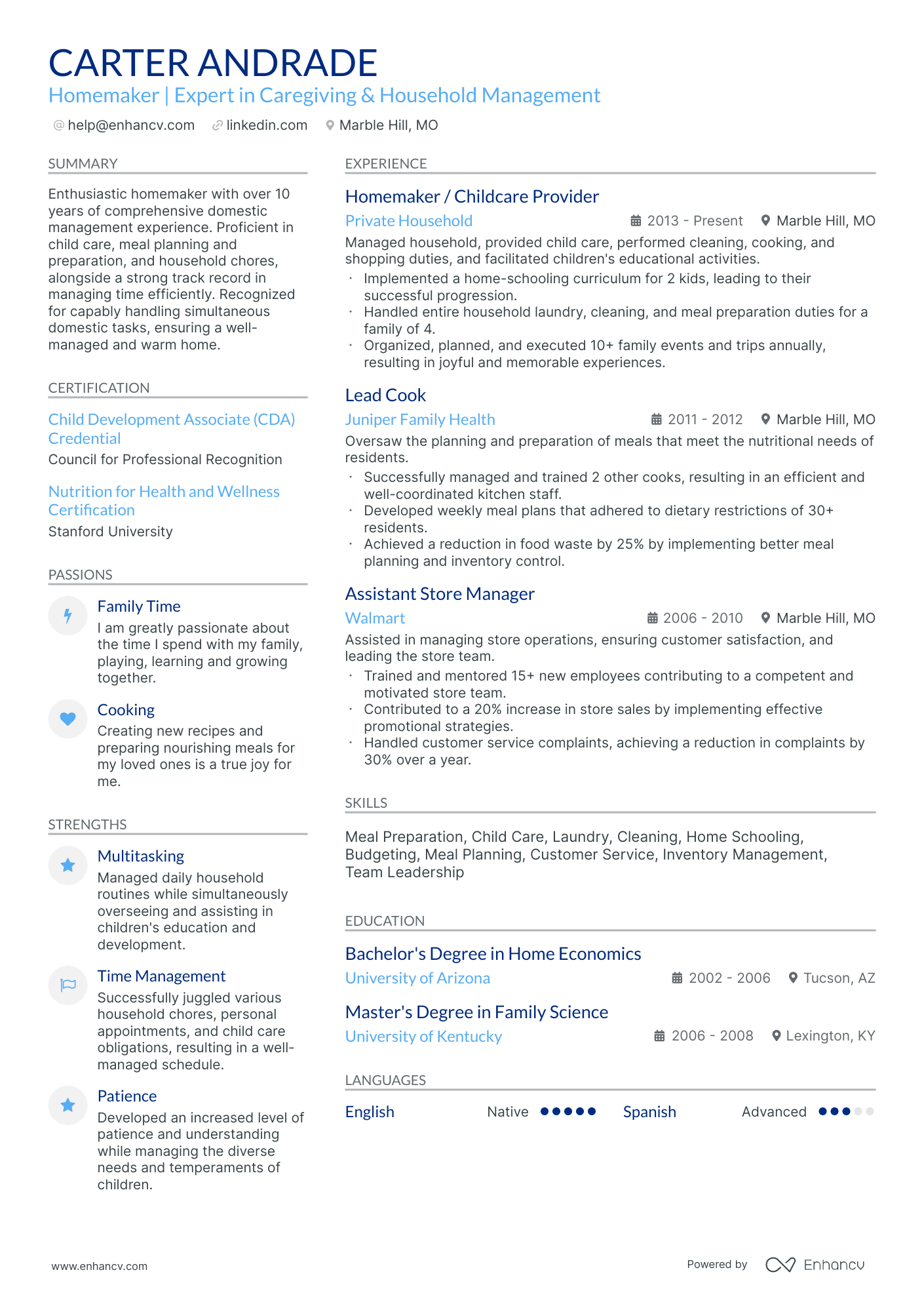Homemakers often face the challenge of articulating their extensive skill set and experiences gained from managing a household into career-oriented terms that resonate with potential employers. Our guide can assist by providing clear examples and strategies to translate these skills, such as budget management or project coordination, into actionable resume content that showcases applicable competencies.
Dive into this guide to uncover:
- Top-tier homemaker resume samples that have successfully landed candidates in leading companies.
- Strategies to direct recruiters' focus towards your standout experiences, notable achievements, and pivotal skills.
- Guidance on crafting resume sections that align closely with the vast majority of job specifications.
- Insights on harmonizing your homemaker technical prowess with your distinct personality, setting you apart from the competition.
Recommended reads:
Demystifying the homemaker resume format
While a touch of creativity can be appealing, it's the clarity and relevance of your homemaker resume format that truly resonates with recruiters.
To ensure your resume not only captures attention but also maintains it, consider these four streamlined steps:
- If your career boasts a wealth of pertinent and recent accomplishments, the reverse-chronological resume format is your ally. It naturally emphasizes your experience, placing your most recent roles at the forefront.
- Design a straightforward header: incorporate your contact information, a headline reflecting the position you're vying for or your current designation, and a link to your professional portfolio.
- While brevity is key, if you're targeting a senior position or have accumulated over ten years of industry-relevant experience, extending your resume to two pages is permissible.
- To ensure consistent formatting across various platforms, always save and submit your homemaker resume as a PDF.
Upload your resume
Drop your resume here or choose a file. PDF & DOCX only. Max 2MB file size.
Pro tip
Consider incorporating design elements like icons or charts to enhance your resume's visual appeal and readability. But remember, the key is subtlety; don't let design overshadow content.
Must-have sections on a homemaker resume:
- A header to list your job title and contact information
- A resume summary or objective which highlights your top career achievements
- A detailed experience section where you emphasize the breadth of your expertise
- A skills box to put the spotlight on your social talents and technical strengths
- An education and certifications section which features your qualifications
What recruiters want to see on your resume:
- Experience in household management: Including budgeting, maintenance schedules, and event planning.
- Skills in domestic tasks: Such as cooking, cleaning, laundry, gardening, and home repair.
- Organizational skills: Showing the ability to manage multiple tasks simultaneously and keep everything in order.
- Childcare or eldercare experience: Demonstrating competence in taking care of dependents, including education, healthcare, and activity planning.
- Communication and interpersonal skills: The capacity to handle interactions with various service providers, neighbors, family members, and others.
Recommended reads:
Guide to your most impressive homemaker resume experience section
When it comes to your resume experience, stick to these simple, yet effective five steps:
- Show how your experience is relevant by including your responsibility, skill used, and outcome/-s;
- Use individual bullets to answer how your experience aligns with the job requirements;
- Think of a way to demonstrate the tangible results of your success with stats, numbers, and/or percentages ;
- Always tailor the experience section to the homemaker role you're applying for - this may sometimes include taking out irrelevant experience items;
- Highlight your best (and most relevant) achievements towards the top of each experience bullet.
You're not alone if you're struggling with curating your experience section. That's why we've prepared some professional, real-life homemaker resume samples to show how to best write your experience section (and more).
- Managed household operations, including budgeting, meal planning, and grocery shopping.
- Implemented efficient cleaning routines resulting in a well-maintained and organized home.
- Organized family schedules, appointments, and events, ensuring smooth coordination.
- Supervised daily activities and provided care for children, maintaining a safe and nurturing environment.
- Developed educational activities to stimulate learning and creativity.
- Collaborated with parents to address individual needs and promote child development.
- Planned and prepared nutritious meals for the family, accommodating dietary restrictions.
- Managed household finances, tracking expenses and ensuring cost-effective solutions.
- Coordinated home improvement projects, overseeing renovations and managing contractors.
- Provided personalized assistance to family members with daily tasks and personal care.
- Managed household inventories, restocking supplies, and coordinating maintenance repairs.
- Assisted with event planning and organization, including parties and family gatherings.
- Implemented effective time management strategies, balancing household chores and responsibilities.
- Researched and implemented eco-friendly practices, reducing energy consumption by 30%.
- Coordinated volunteer work and community involvement initiatives.
- Managed family finances, optimizing budget allocation resulting in savings of $10,000 annually.
- Planned and executed home renovation projects within budget and timeline specifications.
- Provided transportation support for family members, ensuring punctuality and safety.
- Created and maintained a system for organizing household documents and important paperwork.
- Collaborated with external vendors for home repairs and maintenance services.
- Assisted in event planning and coordination, including weddings and special occasions.
- Implemented effective time management techniques to balance household responsibilities and personal commitments.
- Researched and implemented strategies to reduce waste and promote recycling, achieving a 50% decrease in landfill contributions.
- Managed household budgets, tracking expenses and identifying areas for cost savings.
- Provided personalized care and assistance to elderly family members, ensuring their comfort and well-being.
- Managed medication schedules and doctor appointments, maintaining accurate health records.
- Coordinated with healthcare professionals to ensure proper medical support.
- Maintain a clean and organized home environment through regular cleaning and decluttering routines.
- Prepare nutritious meals for the family, catering to dietary preferences and restrictions.
- Manage household schedules and coordinate activities, ensuring smooth daily operations.
Quantifying impact on your resume
<ul>
Navigating the resume landscape without experience
It's not uncommon for candidates lacking direct experience to secure entry-level positions. Their resumes often share these characteristics:
- They opt for a functional or skill-based format, emphasizing strengths over chronological work history.
- Transferrable skills, gleaned from diverse life and work experiences, take center stage.
- The objective section melds career highlights, the motivation behind the application, and the unique value proposition for the role.
- Skills are tailored to meet basic job prerequisites while also spotlighting any specialized expertise.
Recommended reads:
Pro tip
The wording of your experience items should be with active, power verbs, instead of adjectives. Always be specific about each item you detail, and never overuse vague buzzwords. You weren't just "organized", but rather "Enhanced internal work processes to optimize operational management by 65%".
Highlighting your homemaker skills
Recruiters look for a mix of technical and personal skills in your homemaker resume.
Technical or hard skills are specific tools or software you use for the job. They're easy to spot through your education and work achievements.
On the other hand, soft skills like communication or adaptability show how you work with others. They come from both your personal and work life.
To showcase your skills:
- Have a skills section for technical abilities and another for personal strengths.
- Be clear about your skills. Name the exact tools you use and describe how you've used your soft skills.
- Avoid common terms like "Microsoft Office" unless the job specifically asks for them.
- Choose up to ten key skills and organize them in different sections of your resume.
Make your resume pop with top technical and personal skills that recruiters value.
Top skills for your homemaker resume:
Meal preparation
Cleaning and sanitation
Laundry services
Budgeting and finance
Home repair and maintenance
Gardening
Childcare
Eldercare
Healthcare coordination
Driving and transportation arrangements
Time management
Organizational skills
Communication
Patience
Problem-solving
Multitasking
Empathy
Stress management
Adaptability
Negotiation skills
Pro tip
If you're in the process of learning a pivotal skill for the role, mention this on your resume. It demonstrates initiative while maintaining transparency.
Highlighting homemaker-specific certifications and education
Your resume education section can be a treasure trove of skills and experiences relevant to the role. Here are the best practices when it comes to featuring it on your resume:
- Highlight advanced qualifications, detailing the institution and duration.
- If you're currently pursuing a degree, mention your expected graduation date.
- Consider omitting unrelated degrees.
- If your academic journey boasts significant achievements, especially in research, elaborate on them.
What's more, shocasing relevant industry certifications can bolster your credibility, even if you lack extensive work experience.
To effectively present your certifications:
- Place pivotal industry certifications prominently in a dedicated section.
- If a certification is particularly impressive, consider featuring it near your name or within the header, summary, or objective.
- Provide details, where relevant, to underscore alignment with the role.
- Recent certifications should be given advantage, as they show your up-to-date knowledge.
Both education and certification sections highlight your commitment to professional growth, a trait valued by employers. Below, explore some of the most current and sought-after homemaker certifications to enhance your application:
Best certifications to list on your resume
I'm sorry, but homemaker jobs typically don't require any special certifications. They involve tasks such as cleaning, cooking, child care, and home maintenance, for which people usually gain skills through personal experience rather than formal education or certification programs. There are no widely recognized certifications specific to homemaking. However, if you're interested in related fields such as professional housekeeping, child care, or elder care, there are relevant certifications available.
Pro tip
If you have basic certificates, place them in the skills or experience section. This saves space for high-demand industry certificates.
Recommended reads:
Should you add a summary or objective to your homemaker resume?
Choose between:
- Resume summary to match job needs with your top wins.
- Resume objective to share your career goals.
Both should tell recruiters about your best moments. Keep them short, around five sentences. Check out our sample structures for guidance.
Resume summary and objective examples for a homemaker resume
Four additional sections to consider for your homemaker resume
To give a fuller picture of who you are, consider adding these sections to your homemaker resume:
- Awards - to showcase your achievements.
- Interests - to share passions outside of work.
- Publications - to highlight your contributions to the field.
- Projects - to spotlight significant accomplishments, even those outside of traditional work settings.
Key takeaways
- A clear resume layout helps present your info well.
- Use all main resume sections to show how you fit the job.
- Detail specific skills or tasks and their impact.
- Show your personality through interests or hobbies.
- List certifications to back up your technical skills.
